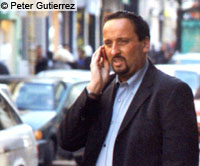Telecoms ask for less regulation
Members of ETNO, the European Telecommunications Network Operators' Association, met with the EU Commissioner for the Information Society and Media, Viviane Reding, on 7 June. They called for more investment and less regulation. ETNO represents 41 telecoms operators in 34 countries, employing around a million staff, and turning over EUR 240 billion. In 2005, they invested EUR 35 billion in new networks for the next generation of Internet connections. This last statistic - investment - is the crux of the problem for ETNO members, who assembled 29 of their CEOs and other representatives to outline their case to Ms Reding. 'Despite massive investment over the last four years, the EU lags behind some of the main players. The EU needs more investment in areas where members used to be world leaders. Regulation is not adapted to a more convergent and mobile world,' said ETNO chair, Michael Bartholomew. The telecoms industry is going through a period of massive change. Driving that change is the Internet. When the Internet bubble gathered pace at the turn of the millennium, there were high expectations, and companies rose and fell by the month. Now, the move to broadband computer connections blurs the line between Internet, telecoms and broadcasting, and those possibilities can finally be realised. Television can be watched over the Internet, phone calls can be made over the Internet, but fast Internet or broadband connections still need a phone line or cable. The proliferation of mobile phones also encroaches onto this territory with mobile TV and other gadgets. The market for these services, and the parallel business market, is huge. Much Europe's future prosperity will depend upon effectively exploiting the new web capabilities, dubbed www2 (world wide web mark 2). However, the regulatory landscape is fragmented. ETNO members want to have less regulation, and fewer defined markets. The EU currently regulates 18 distinct telecoms markets, and this impedes the opportunities for competition, according to ETNO. Companies may be strong in mobile phone technology, but weak in fixed connections, or vice-versa. They may only act as an Internet provider, but all of these companies may offer the same services. ETNO urges the Commission 'to provide incentives to invest and have a return on that investment. Incentives are needed now so that by 2010, we have the infrastructure needed,' according to Mr Bartholomew. 2010 is the target for the 'information society', where telecoms will underlie much of the technology we will use and information that we will have access to. ETNO members believe that market forces should drive the roll-out of new networks, which will also free up the network to new innovations not yet invented. 'It is critical that changes anticipate market trends. Otherwise the framework will be outdated before it comes into force. We hope the Commissioner will have the courage to adopt and embrace deregulation on June 28,' said Mr Bartholomew. Miroslav Majoros of Slovak Telekom believes that a system that puts direct competitor - for example phonecalls from a fixed line, a mobile phone and through the Internet - in different markets is unworkable. 'We have to start looking at regulation from a customer-centric perspective. How does the consumer react to different prices to do the same thing? If regulation does not follow, then regulation makes no sense,' he said. Henning Dyremose, president and CEO of TDC in Denmark said: 'I do not want to give the impression I am disappointed. The Commissioner and her staff took careful notes, and we were promised another chance to make our case later on. I still have great hopes,' he said. Boris Nemsic, CEO of Telekom Austria was disappointed, however, not to have had mobile roaming charges discussed at the meeting with Commissioner Reding. Perhaps the most important point made about the move towards i2010 came from Eircom's Philip Nolan, who said: 'There is much more broadband availability than take-up. The [EU] could help here to try and grow demand.' However, some members pointed out that countries in new Member States and prospective Member States have an imbalance in their telecoms make-up. Countries may have a minimal, 15-20 per cent penetration, but a huge mobile penetration of 70 per cent. This point was taken up by Poland's Marek Józefiak, CEO of TPSA. 'There is no greater regulatory challenge than to bridge the digital gap,' he said. Ms Reding is expected to make known her plans for the telecommunications review on 28 June.



